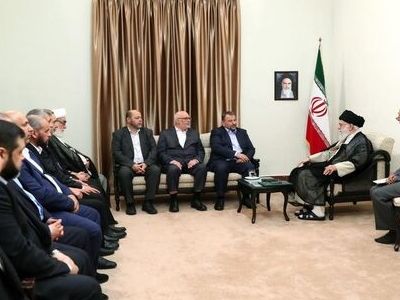Israeli Folly: How Netanyahu Cemented the Hezbollah-Hamas-Iran Alliance

Supreme Leader of Iran, Ali Khamenei (2nd R) meets Saleh al-Arouri (3rd R), deputy leader of Hamas. (Photo: via MEMO)
By Ramzy Baroud
To serve his limited political agenda, Israeli Prime Minister, Benjamin Netanyahu, may have unwittingly unified various resistance groups in the Middle East after years of separation and discord.
On August 24-25, Netanyahu ordered the Israeli army to strike several targets of parties he perceives to be allies of Iran in the region. The unprecedented military campaign included Syria, Lebanon, Iraq, and Gaza.
Within hours from the strikes, triumphant Netanyahu swooped in to collect the political rewards, bragging about the military operation, and warning Lebanon “to calm down”, because in his opinion, Hezbollah leader, Hassan Nasrallah, “knows very well that the state of Israel knows how to defend itself well, and to repay its enemies”.
Tel Aviv’s friends in Washington were ready with statements of support about “Israel’s right to defend itself,” as bizarrely reiterated by the US Secretary of State, Mike Pompeo.
Israel’s friends in the mainstream media also clamored to make connections between Iran’s Islamic Revolutionary Guard Corps, Hezbollah in Lebanon and Hamas in Gaza.
The truth, however, is that the Syria war had severed the once-strong alliance between the Palestinian resistance group, Hamas and Iran, and by extension, Hezbollah as well.
The Syrian bloodbath has done much damage beyond these alliances as well, dividing the Middle East region in a proxy war that roped in, not only politicians and fighters but intellectuals as well.
That aside, the Syria war is now winding down and Israel is terrified by the possibility of having a permanent Iranian military presence near its northern borders, and is especially concerned that Hezbollah has already neutralized Israel’s military advantage in Lebanon.
While there has always been a faction within Hamas (mostly centered in Gaza) that viewed an alliance with Iran as a strategic advantage – a view that was cemented by years of Iranian support for the Gaza resistance – others moved very carefully so as not to upset delicate regional balances.
However, following the isolation of Qatar by several Gulf and other Arab and Muslim countries, Hamas’ political margins began expanding again. Hamas has been particularly close to Qatar and Turkey but since these two countries were forced to rethink their foreign policy in the region, Hamas enjoyed more breathing space.
On June 6, 2017, Qatar left the so-called Arab coalition that has devastated Yemen in a lethal war that began more than four years ago. Meanwhile, the changing realities in Syria forced a Turkish rethink about its own alliances in Syria and within the Middle East.
Iran is also finding itself in a political transition. The US decision to abandon the Iran nuclear deal – The Joint Comprehensive Plan of Action – and the levying of yet more debilitating sanctions on Tehran, are placing tremendous pressure on the Iranian economy. However, Washington’s efforts to isolate Iran are encouraging Tehran to seek political alternatives, especially as Iran’s new feeble European allies are incapable of circumventing the hawkish US agenda.
Since the Qatar siege, Iran has sent many friendly signals to Doha while reaching out to Istanbul, mending fences and exploring new alliances.
This changing reality has emboldened the Hamas branch that was never convinced of breaking up with Iran in the first place. In February 2017, Yahya Sinwar was elected as the new leader of Hamas, shifting the center of the group’s decision making back to the besieged Strip. A resumption of strong ties between Hamas and Iran seemed inevitable.
The Israeli bombing of several targets at multiple fronts was meant to send a message of strength to Netanyahu’s constituency just before the September 17 elections. The strategic Hezbollah response on September 1, following days of dread and anticipation in Israel, hardly helped Netanyahu’s struggling image.
On September 2, Hezbollah revealed more details about its military response. The group released a video showing the targeting of an Israeli military vehicle by two separate missiles shot with total accuracy only seconds apart. The video also showed aerial images taken by a Hezbollah drone hovering above Israeli settlements and military bases.
Once more, Hezbollah has demonstrated its ability to balance out Israeli aggressions. But equally important, Hezbollah’s calculated response, laden with political and military messages, was the opportunity that Hamas needed to make its move.
On September 1, Iranian media reported on a letter attributed to former Hamas leader and Palestinian Prime Minister, Ismail Haniya, expressing “his appreciation to the Leader of the Islamic Revolution, Ayatollah Khamenei, for his support for the Palestinian Resistance”. Various Iranian news agencies reported on the letter, along with archival photos of the Hamas leader in a meeting with Khamenei.
Israeli and pro-Israeli media also reported on the letter to retrospectively justify the Israeli bombings of the multiple targets, by demonstrating that indeed, such an alliance exists.
However, the Hamas-Hezbollah-Iran alliance has been forged and strengthened by Netanyahu’s military miscalculations.
Soon after Hezbollah declared that it had responded to the Israeli attacks, Hamas issued a press release, congratulating the Lebanese group, saying that “the Lebanese resistance has the right to defend itself and its people in the face of (Israeli) aggression”.
This by no means suggests that Hamas will now lease its foreign policy to Tehran. The same is true for Hezbollah which, despite its strong alliance with Iran, has its own national agenda, political balances, and priorities as well.
What remains clear, however, is that Netanyahu has foolishly, though unwittingly, helped Hamas cross the final obstacle in its efforts to return to the Iran-Hezbollah camp in the region.
Now that the war in Syria is coming to an unceremonious end, this fact could prove very costly to Israel and its drive to dominate the region and its peoples.
– Ramzy Baroud is a journalist, author










































0 Comments